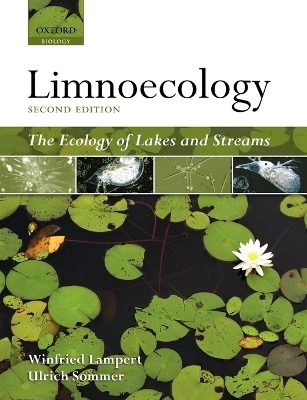
Limnoecology
Oxford University Press (Verlag)
978-0-19-921393-1 (ISBN)
This concise, readable introduction to limnology (the science of investigating the structure and function of inland waters), places the subject in the context of modern ecology. Unlike most ecological textbooks, which use examples taken almost exclusively from terrestrial systems, this book integrates the fields of limnology and ecology by presenting empirical data drawn entirely from freshwater ecosystems in order to advance ecological theories (limnoecology).
This second edition builds upon the strengths of the first with the structure of the book following the same hierarchical concept of ecology, from habitat properties, individuals, populations, coupled populations and communities to ecosystems. However, it has been thoroughly revised throughout to incorporate findings from new technologies and methods (notably the rapid development of molecular genetic methods and stable isotope techniques) that have allowed a rapid and ongoing development of the field. There is a new emphasis on food webs, species diversity and ecosystem functioning, climate change, and conservation management. Key ecological questions are examined in the light of the latest experimental evidence. Throughout the text evolutionary theory is applied to an understanding of freshwater ecosystems, thereby filling a niche between traditional limnology and evolutionary ecology.
This accessible text is suitable for both undergraduate and graduate students taking courses in limnology, freshwater ecology, and aquatic biology as well as the many professional limnologists, ecologists and conservation biologists requiring a concise but authoritative overview of the topic
Winfried Lampert is Director Emeritus at Max Planck Institute for Limnology, Ploen, Germany, and is a Honorary Professor at the University of Kiel. He received the Naumann-Thienemann medal of the International Society of Limnology in 1995. Before his appointment to the Max Planck Society he worked at the universities at Freiburg, Constance and Frankfurt were he developed his experimental, evolutionary approach to plankton ecology. Ulrich Sommer is Professor of Biological Oceanography at the Leibniz-Insititut of Marine Sciences at Kiel University, Germany. His background is originally in limnology. He has become well known for his mechanistic, experimental approach to phytoplankton community ecology. He worked at the universities of Vienna and Constance and at the Max Planck Institute at Plön, Germany, before he moved to the universities of Oldenburg and Kiel to apply a similar approach in marine systems. Ulrich Sommer has written and edited several books on plankton
1. Ecology and Evolution ; 2. Methods of Ecological Research ; 3. Special Features of Aquatic Habitats ; 4. The Individual in its Habitat ; 5. Populations ; 6. Interactions ; 7. Communities ; 8. Ecosystem Perspectives ; 9. Final Remarks
| Erscheint lt. Verlag | 26.7.2007 |
|---|---|
| Zusatzinfo | numerous line figures and halftones |
| Verlagsort | Oxford |
| Sprache | englisch |
| Maße | 189 x 246 mm |
| Gewicht | 722 g |
| Themenwelt | Naturwissenschaften ► Biologie ► Botanik |
| Naturwissenschaften ► Biologie ► Limnologie / Meeresbiologie | |
| Naturwissenschaften ► Biologie ► Mikrobiologie / Immunologie | |
| Naturwissenschaften ► Geowissenschaften ► Hydrologie / Ozeanografie | |
| ISBN-10 | 0-19-921393-3 / 0199213933 |
| ISBN-13 | 978-0-19-921393-1 / 9780199213931 |
| Zustand | Neuware |
| Haben Sie eine Frage zum Produkt? |
aus dem Bereich


